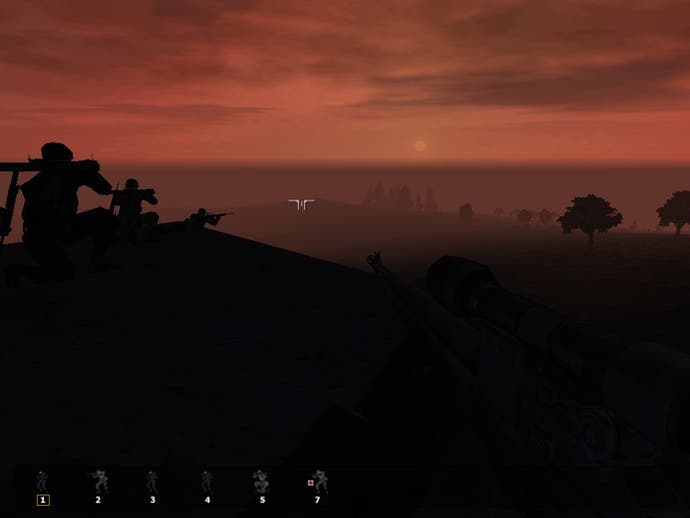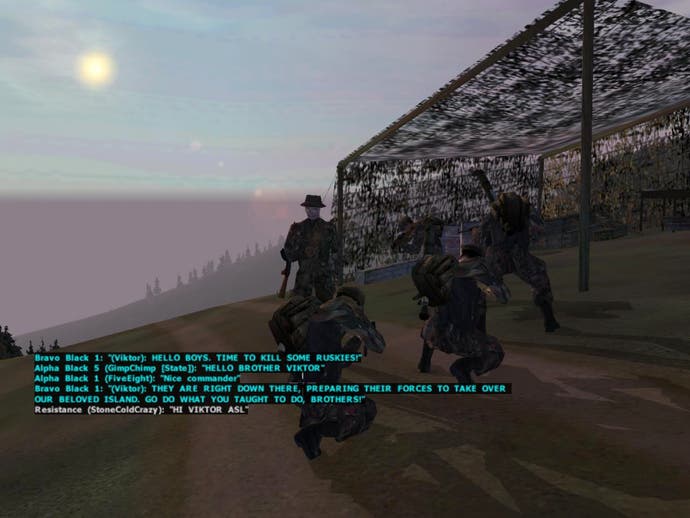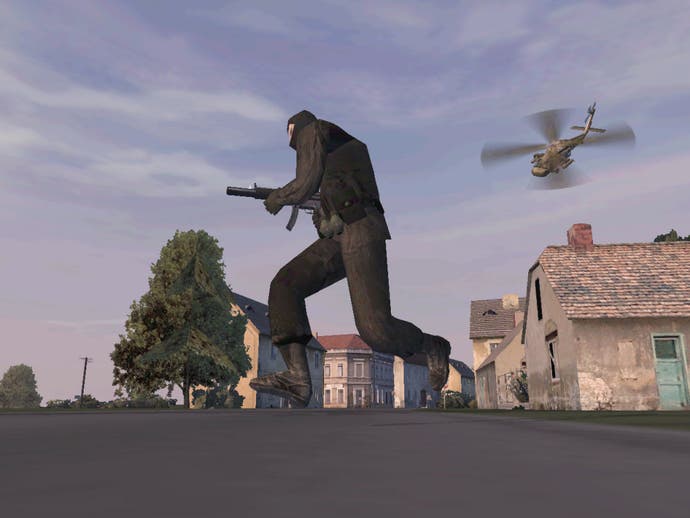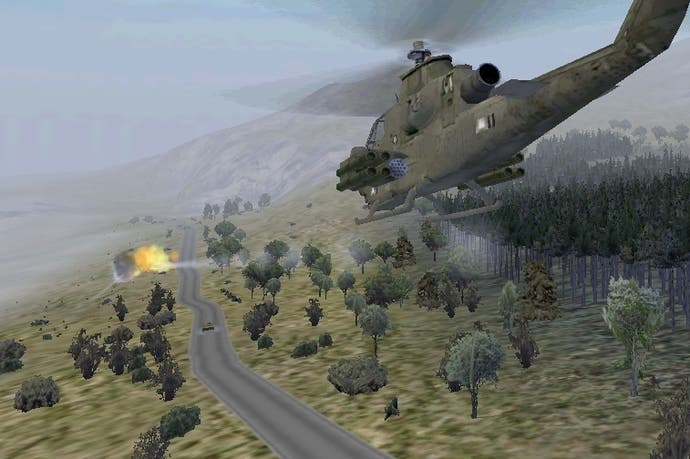Operation Flashpoint retrospective
A surgical strike.
I'd never gone to war before.
I thought I had, because ever since I'd been a child I had played bucketloads of MicroProse simulations, the sort of late 80s and early 90s games that put you in helicopters or jet fighters or submarines, that sent you to Vietnam or Iraq or the South Pacific. They were games that asked for diligence and which did their best to reward you with a realistic representation of whatever it was they were a game about.
They were child's play and, for the child I was then, they were more than adequate.
Later, there were the strategy games, remote and disconnected experiences of command, and then first-person shooters came to the PC, showing us all how we could be super soldiers, gunning down hordes of grunts and gulping up medpacks. It wasn't until 2001 that Operation Flashpoint showed us what it was like to be one of those grunts: weak, fragile, helpless. Useless.
Here's what Operation Flashpoint taught me about war: it is lonely. It is the loneliest and most powerless experience you will ever have.
Flashpoint arrived just as shooters were entering their first phase of faux-realism, with titles like Delta Force and Soldier of Fortune making the most cursory of nods to something beyond the arcade action of Quake and Unreal. But for gamers who thought these offered an authenticity that had previously been lacking, Flashpoint must have knocked them sideways. It must have given them concussion.

Flashpoint imagined a small-scale Soviet-NATO clash in the mid 1980s. It was a skirmish just big enough to let both sides throw all their most exciting hardware into the fight, everything from snipers to SCUDs and, mission by mission, the game would tease a new vehicle or unit of some sort. This mission would be your first chance to ride in an APC, this one would give you your first go with an RPG while this one showed you your first Soviet helicopter.
The canvas for this combat was a trio of fictional islands, each one a huge open world painted with woodland and speckled with towns and villages. Each had a faintly Scandinavian feel, with rocky mountains surging from the ground and dark forests thick with brush. Flashpoint was not only a military simulation, it was a world to get lost in, a world of great distances where the only border was the sea.
Though it certainly was a simulation too, but not in the way we'd come to expect. Previously, military simulations wanted you to know they were simulations. They were all about the statistics of war, desperate to show you dials and readouts, numbers and co-ordinates, as you sat in your cockpit or captain's chair. But being a soldier on the field of battle meant having no information in front of you, no HUD, no stats, no confirmation of what you hit or when, of what happened or why. Your equipment was your compass and your map; your weapon a wavering rifle that, if you kept firing it, would drain all of your ammunition within a minute.
This time the simulation was hidden, whether in the realistic bullet trajectories or even in the speed of sound, which had been built into the game engine and which had distant targets exploding in silence before faint rumbles rolled forth. And this time, where other simulations had been about power and control, about mastery of equipment and instrumentation, Flashpoint was about impotence and ignorance, the true experience of a soldier at war.
This experience came with certain rules, the first of which was: if you are being shot at, you hit the dirt. You don't turn to look, you don't fire back, you don't run. You hit the dirt because the enemy can already see you, you are already losing this fight and one bullet can end you. With luck, you might be able to spot your attacker and the chances are they're going to be little more than a pinprick of muzzle flash in a bush four hundred meters away. You're losing because it was your job to be that pinprick to them, something you could've been if you'd spotted them first.

Then there was the second mission of the game, the mission in which you lost. After a cursory introduction, your second outing sent you into a fight where you'd be outgunned and outmanoeuvred, where your final orders, those issued after the last of your squad were cut down, would be to flee. Within every gamer I know the urge to win surged forth and they tell me how they tried to find ways to take on their attackers, to take out the enemy, but it was impossible. It was Flashpoint's harsh introduction, with which it laid down the rules of engagement. Sometimes things will go wrong, it said. Sometimes, objectives will change. Sometimes, it just won't work out. Sorry, it's war.
The first missions were exercises in following orders - stand here, walk there, shoot at this, take cover - but in time, they gradually afforded more agency, placing different weapons in your hands and giving you more freedom to roam before, eventually, granting you the mixed blessing of responsibility. Then Flashpoint suddenly jumped tracks, taking you out of the body of an infantry soldier and following the parallel stories of a tank commander, a pilot and a special ops agent.
While each of these roles brought something very different to the battlefield, giving you a new sense of strength when you commanded tanks or helicopters, they never stopped you being vulnerable. Vehicles had their own drawbacks, chief among them being an inability to actually spot things. While cannons and missiles made them mighty, a single soldier in a bush with a rocket launcher was practically invisible and quite deadly.
There was never time to be complacent and Flashpoint always found new ways to both challenge you and make you fragile. It may seem a strange comparison to make, but one of the games I most closely associate with Flashpoint is Thief, and while some missions had you smashing enemy bases with armoured columns, more than a few required tact, stealth and total silence.
Take, for example, the escape mission where you must guide your downed and unarmed pilot through enemy territory, navigating through the night using nothing but the stars. Then there's another where your objective is simply to get yourself home after your squad has been lost. A helicopter circles above while soldiers fill the forest about you as, once again, you find yourself so alone. The best approach here, as in so many missions was not to engage the enemy but to avoid them, to find another route or to only start fights you knew you could win. One of my most enduring memories in all my years of video gaming is playing a special ops soldier on a night mission and finding myself hiding out of sight of a Soviet tank, just below a ridge. As its engine rattled and as it slowly crawled forward I was desperately, pleadingly hoping that it wouldn't spot me. I had never felt so utterly helpless. I was an ant.

There was nothing artificial about the vulnerability in Flashpoint, nothing forced - it was simply harsh, bleak and unforgiving. It frequently put you in situations where, if you slipped up or if you got your timing wrong, you were screwed. Sometimes even just firing your gun was an act of suicide, which was a strange and yet starkly realistic thing for a soldier sim to show you; other times you wouldn't have the equipment you needed to counter a threat, you might have to take the long way round to stay safe, or you might simply have to run away.
There could be a lot of running away and a lot of ending up abandoned with nothing but the grey and barren landscape as a companion. There were plenty of places where, if you died, nobody would know that you'd fallen. I should add that a strict limit of one save per mission certainly bred diligence.
Other missions were almost free-form puzzles, simply presenting you with an objective, a handful of equipment and half an island to explore. Ammo caches could be raided, weapons seized and enemy vehicles commandeered. I completed the final, island-wide mission by capturing a tank, then a fuel truck, then using that to replenish a helicopter which I used to rain death from the skies. I could also have used a sniper rifle and a few hand grenades, spurning my squad and going it alone.
Twelve years on, Operation Flashpoint is now known as Arma: Cold War Assault, and while a busy mod community kept the game active for many years, the subsequent Arma games have long since overtaken it. It's only natural that it should look so weathered, and yet I find those barren, angular vistas to be oddly chilling. I remember running across them, so often by myself, so often for miles at a time, and while I smirked even then at the game's eccentric music and gyrating soldiers, I knew that there was death in that distance. It might be a machine gunner five hundred meters away, a sniper even further, or it might be something much larger that would find me exposed and alone, a single soldier as helpless as any other when caught in the open.
This helplessness was the true horror of war. Nothing had captured it before and, all these years later, still few have captured it since.









